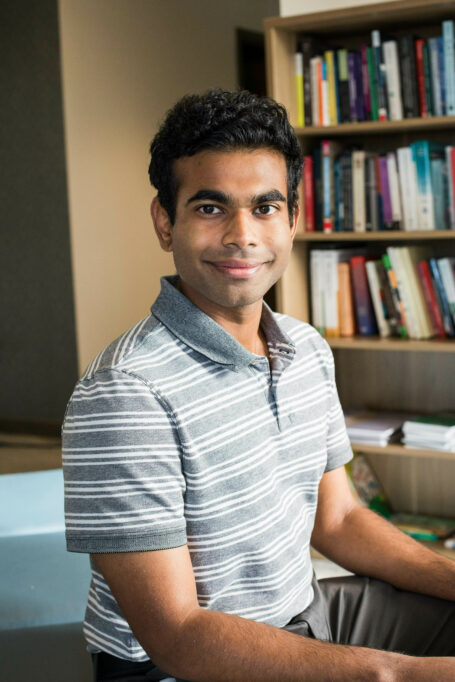
Abhijeet Ball is a Senior Research Analyst at Education Analytics and joined EA in 2020. Abhijeet is from Dhaka, Bangladesh and he graduated from Kenyon College with a bachelor's degree in mathematics. Abhijeet regularly works with R, SQL, Linux, and Git.
How would you describe your role on the Analyst team?
I specialize in projects that focus on research-based analytics. This often means working within a cross-functional team comprised of strategists, research scientists, and other analysts. We work closely with our partners to develop a contextual understanding of their data and provide metrics for program evaluation, informational purposes, and high stakes decision-making. For example, I worked on a project with a school district last year, where the district utilized metrics we gathered to help distribute annual teacher bonuses.
My project work usually involves aligning internal and external stakeholders. I often find myself translating in some sense. This could be translating various levels of technicality within my cross-functional team or in communication with external partners. This could also involve translating mathematical models into code or policy decisions into data processing procedures and vice versa. When I lead a project within the analyst team, I also help scope the project, create timelines, and delegate tasks.
What interested you in working at EA?
I think it was a result of my academic interests and my leaning towards mission-based work that drew me towards EA.
I grew up in Dhaka, Bangladesh and moved to the US for undergrad. Bangladesh is a relatively new country that has improved along multiple dimensions of welfare in a short time. This is partly due to the role of non-profit organizations. Non-profit organizations such as Building Resources Across Communities (BRAC) are very visible in the country and made me admire the work of non-governmental agencies working in development. Throughout high school I worked alongside non-profit organizations doing development work, and I remember wanting to be a development economist. In college, I majored in Math and took coursework in economics and was very interested in working with data in a way that tangibly improved people’s lives.
My first internship out of college was in a Boston-based education non-profit. I was a data analyst for one of their programs that aimed to improve students' mathematics education experience. I found myself working with former teachers who were now working as academic coaches. The metrics and graphics I produced were used by my colleagues in their work with teachers at partner schools to devise intervention strategies to improve student outcomes. This experience gave me a tangible example of analytics being used for social good. Sometime during this internship, I searched the phrase ‘education analytics’ on Google and here we are.
We know that every day is different, but what would a typical day at EA look like for you?
I usually work simultaneously on a few projects that might be in different phases depending on the time of the year. The work I do might range from putting down code, joining internal project team meetings, or participating in meetings with external partners. The analyst team is also constantly working on improving internal tools and processes. This quarter, I am using some of my non-project time to improve some of our existing quality control tools and build some new ones.
During the last few years, I was also a part of our DEI team and served as the co-lead last year. This work was vastly different from my analyst work, and I developed a different set of skills. I got to think about EA at a strategic and institutional level. Some of my day-to-day tasks in this role involved creating team meeting agendas, checking in with other team members, and making progress on co-lead specific projects such as completing discovery work for what an org-wide DEI strategy might look like.
What skills do you possess that you find helpful in your role?
I am deeply curious about developing a contextual understanding of data, and I am often thinking about questions such as:
- How was the data collected?
- What is the data conveying and what is it failing to convey?
My experience working with non-profit practitioners and teachers helped me center the human aspects of the data I worked with. After my internship in Boston, I volunteered full time at a state receivership school. This gave me a firsthand account of the lived experiences of the people working within and alongside the PK-12 education system. This experience continues to influence the way I approach research, data, partner needs, and issues of equity and centering the individual.
I have strong communication skills. I recall my math professors putting an emphasis on developing our communication ability. One of my professors always had a small fraction of points reserved for language and style when grading proofs. My upper-level math classes were also structured in such a way that students were regularly asked to present their work to classmates. These experiences prepared me to be able to communicate complex technical details using precise language when writing out documentation or interacting with project stakeholders.
What is the most rewarding aspect of your role?
What comes up immediately for me are the learning opportunities that come with working alongside my smart and talented colleagues. I often find myself picking up new technical and project management skills when I work with an analyst team member I have not worked with before. The analyst team is also very collaborative, and people are more than happy to get on a call to think through problems. This culture of collaboration extends across the organization, as I've also witnessed this collaborative nature within my work with teams outside of the analyst team. For example, partner strategists are always happy to provide broader policy context for our work and research scientists are more than willing to discuss the nitty gritty of methods and approaches.
We work on quite demanding and fast-paced projects. I think what motivates me during more challenging times is centering on the social impact of the work that we do. EA is serious about taking on DEI issues, both institutionally and in the work with our partners. DEI work is challenging and cyclical so there is always room for growth. However, the leadership at EA is willing to engage in difficult conversations and I think we are making progress. Being able to contribute towards this progress feels very rewarding.
What is your favorite project that you’ve worked on at EA?
A memorable project for me involved evaluating a principal training program for a non-profit based in Philadelphia. I worked closely with one of our research scientists to see if we could uncover the program's effects at the school level on different outcomes such as student achievement, principal retention, teacher retention, student attendance, and school climate. I started working on this project during my first year at EA and it left a strong impression on me for a couple of reasons. We used mostly publicly available data on the internet to analyze the different outcomes, which made me realize the value of easily accessible data. The project’s focus on using non-test outcomes to evaluate school performance in a holistic way made me start thinking critically about the different types of data that could be leveraged when trying to understand student experiences.
I also enjoyed my tenure with the DEI team. The DEI team consists of members from different functional teams at EA and Executive Team members. Working closely with this group was a rich learning experience. I was constantly in awe of my colleagues’ different skillsets and institutional knowledge bases.
If you had to choose a different team to work on at EA, which team would you pick and why?
This is a tough one. And I will cheat and choose two different teams. I think Data Engineering would be a good team to join. I would like to learn about building data systems and pick up some of their fancy technical skills. Another team I would love to work on is the Partner Strategy team. I really like the idea of being able to actively work with partners to understand their needs and ideate solutions
I am also very intrigued by EA as a non-profit technology firm. I think we occupy a unique space and with that we are presented with unique challenges. I am a big fan of experiential learning and would not mind a rotational program through our G&A teams. Yes, I really blew past the “a team” premise of this question.
What changes do you anticipate in your field in the next year?
We are seeing a lot of interest from partners in building out interoperable data systems using Ed-Fi. This should give the analyst team access to more timely and better-quality data and should enable us to build out analytics solutions that help teachers and administrators make day-to-day decisions. We already have a few implementations of such products, including Podium and the Rally Analytics Platform. I think we will continue to grow these products' capabilities and expand coverage to more partners in the next few years. I expect EA to continue to develop more products that have more proactive use cases in contrast to the reactive use cases that some of our legacy projects addressed.
I am also interested in seeing how coding assist tools such as GitHub Copilot might be integrated within our workflows if EA starts to adopt this across different teams. A lot of the code that is written on the analyst team can be quite bespoke depending on policy and the broader context of the external partner data sets. I am interested in seeing how a generative AI tool might perform in this context.

What is something you enjoy in your free time?
While living in Madison for the last few years I started to take up running. There are incredibly beautiful trails by lakes Monona and Mendota. I was living in the isthmus areas and running was a wonderful way of taking the sights in. I recently moved to Chicago and now Lake Michigan is a stand-in for my Madison lakes. I also enjoy fiddling around with my guitar and singing. This year I took the big step of continuing to run outside during the cold!
When you were a kid, what did you want to be when you grew up?
I have wanted to be a development economist since I was five. Just kidding! I remember wanting to be a pilot. I have yet to learn how to ride a bicycle. Once I know how to navigate this vehicle, I will start to work myself up to a plane. Hopefully, by this time, technology also makes the 20/20 vision requirement for this defunct.
What is something that you would tell your younger self about your career?
I would probably tell him that he was going to meet the lofty expectations he set for himself and the ones that were placed on him and to not worry too much about the future.
My parents put me in an elite school with the expectation that this would make me capable of securing admission to a college abroad. We were not too financially well off so the baked in expectation here was that I also secure scholarships or financial aid to finance this. I am grateful that somehow, I was able to make this happen.
I always envisioned that my work would involve doing something that advanced social good and addressed societal inequities. I am fortunate that I was able to end up working for a mission-oriented organization like EA where such work is central to its mission. International students have less flexibility in choosing career paths after graduation and I am grateful that I was able to find my way to EA.